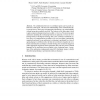Free Online Productivity Tools
i2Speak
i2Symbol
i2OCR
iTex2Img
iWeb2Print
iWeb2Shot
i2Type
iPdf2Split
iPdf2Merge
i2Bopomofo
i2Arabic
i2Style
i2Image
i2PDF
iLatex2Rtf
Sci2ools
104
click to vote
ATAL
2001
Springer
2001
Springer
Ontological Overhearing
Abstract. The collaboration between two intelligent agents can be greatly enhanced if a third agent, who has some understanding of the communication between the first two, intervenes with appropriate information or by acting helpfully without having been explicitly involved. The behavior of the latter agent, which is quite common in human interaction, is called overhearing. We present an agent architecture modeling the overhearing behavior. In particular, we focus on overhearing based on ontological reasoning; that is, the overhearer semantically selects pieces of communication according to his own knowledge (ontologically organized) and goals. In our architecture, overhearing is performed by a team of agents playing two different roles: the first role (overhearer) classifies the overheard communication according to a formal ontology; the second role (suggester) makes appropriate suggestions at the appropriate time point. We present a formal language for the interaction between agen...
| Added | 28 Jul 2010 |
| Updated | 28 Jul 2010 |
| Type | Conference |
| Year | 2001 |
| Where | ATAL |
| Authors | Marco Aiello, Paolo Busetta, Antonia Donà, Luciano Serafini |
Comments (0)

